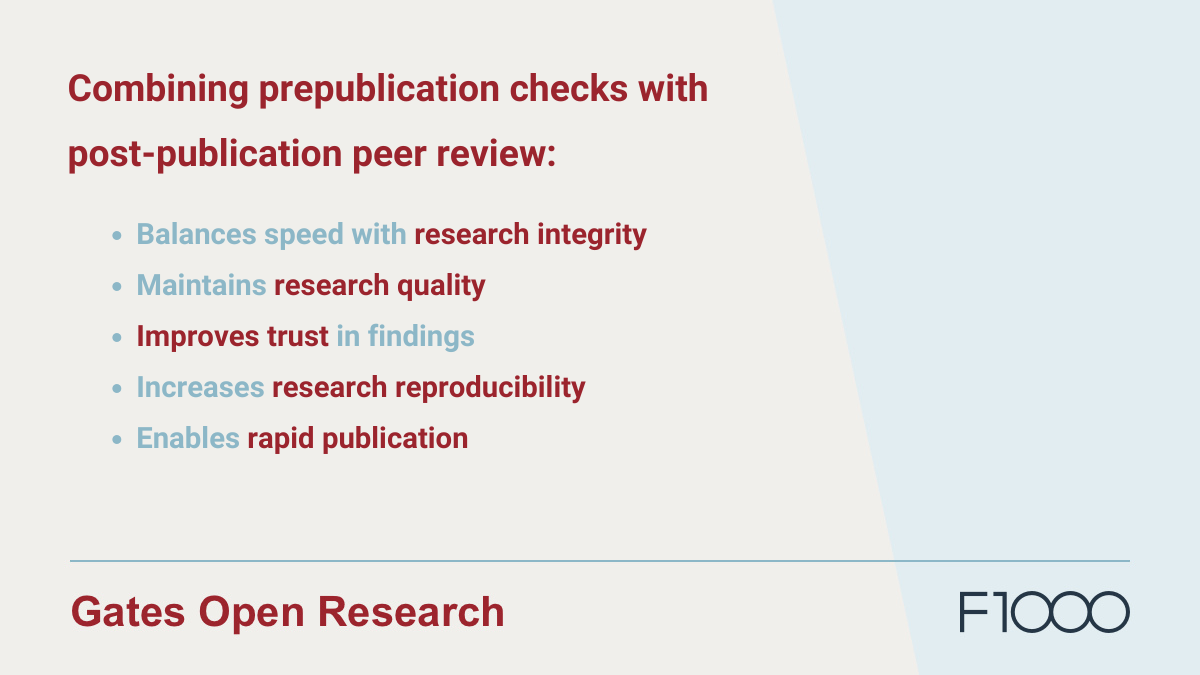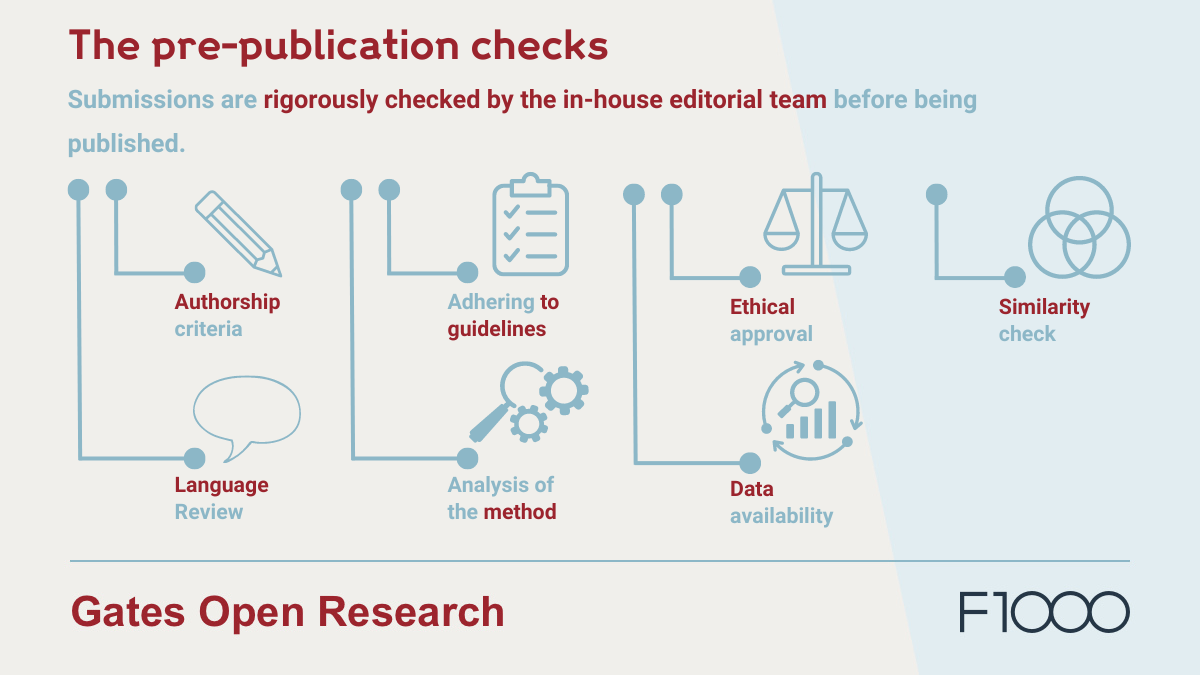Prepublication Checks
Prepublication Checks
Prepublication Checks Page for Gates Open Research
Gates Open Research operates a post-publication peer review model, meaning that articles are published before peer review takes place. To ensure the quality of the papers published, every submission is subject to rigorous prepublication checks carried out by our in-house Editorial Team. Our professional editors ensure that all articles adhere to Gates Open Research’s guidelines and policies, which are informed by international publishing standards, and use their extensive expertise to assess the quality of all research submitted to the publishing venue.

Please see below for more detail about these checks and the prepublication process.
Overview of the prepublication process
- Author submits their article according to Gates Open Research’s guidelines and policies.
-
Our Editorial Team conducts several prepublication checks on the article to ensure there are no significant concerns before publication. Checks include:
- Authors revise the article as needed following prepublication checks. If issues raised at prepublication checks are not satisfactorily resolved, the article will not be accepted for publication.
- Once authors have revised the article appropriately, the article is accepted and will pass to the production stage ready for publication.
Details about the prepublication checks
Prepublication checks are in place to ensure the quality of work published on Gates Open Research.
The process may require discussion with and/or article revision by the authors. The Editorial Team will liaise directly with the submitting author via email. We ask that authors respond to all queries within two weeks.
If a submission fails the prepublication checks and the issues identified are not satisfactorily resolved, the article will not be accepted for publication.
Author criteria
The Gates Open Research platform is set up to make it easy for researchers funded by the Gates Foundation to share their results and insights rapidly, and to facilitate a constructive scientific discussion.
The authorship criteria for publication are:
- At least one author on the research article must be formally affiliated with Gates Foundation funding. This can be any type of research grant or funding made through a Gates-funded research center or program, regardless of grant end date. (Articles with multiple funding sources are welcome, as long as one author meets the key criterion.)
- Current and past grant holders are eligible to publish research which arises from their Gates Foundation funding.
- Gates-funded students are welcome to publish on their own provided their supervisor endorses the paper prior to publication.
On submission, authors will be asked for the grant number (OPPID).
Article types
Articles are checked to ensure they meet the criteria and format of our specific article types according to our
Article Guidelines.
Originality
All articles submitted to Gates Open Research must be original. The work, or significant parts of it, must not have been published previously or be currently under consideration or review elsewhere (excluding preprint servers). Gates Open Research uses Crossref’s similarity checker (
iThenticate) to check for plagiarism in articles. Our team will reject the article if apparent plagiarism, including self-plagiarism, is identified.
Language and readability
Articles must be written in clear language and must be coherent, such that readers can follow the information presented and arguments made without difficulty. A light copyedit will be provided by the Editorial Team. If your article fails the prepublication process due to readability or quality of language, you may be asked to have your article professionally copyedited before revising for resubmission.
Methods
We check that the details of methods and resources are provided, so the work can be assessed during peer review and beyond. We will ask the author to comment on whether more information would be required for others to reproduce the work.
Policies
We check that the article adheres to all other Gates Open Research policies including competing interests, registration of trials and systematic reviews, reproducibility, and standards of reporting. More information about publishing policies can be found
here.
Data availability
All articles must include a Data Availability Statement, even where no data is associated with the article. All articles reporting original results must include the raw data underlying those results. This should be uploaded in an open format to a data repository with a license and a persistent identifier, which allows reuse by others in line with the
FAIR Data Principles.
The Gates Open Research data policies require default open access to any data underpinning a publication. However, there are some exceptions in place for specific situations.
More details, including those relevant to exceptions, can be found on the Gates Open Research
Data Guidelines page.
Ethics compliance
All studies involving humans (individuals, human data or material) must have been conducted according to the principles expressed in the
Declaration of Helsinki. Approval must have been obtained for all protocols from the authors’ institutional or other relevant ethics committee (Institutional Review Board, IRB) to ensure that they meet national and international guidelines. Details of this approval must be provided when submitting an article, including the institution, review board name, and permit number(s).
Human studies categorized by race/ethnicity, age, disease/disabilities, religion, sex/gender, sexual orientation, or other socially constructed groupings, should include a justification of the choice of definitions and categories, including whether any rules of human categorization were required by the relevant funding agencies. Appropriate non-stigmatizing language should be used when describing different groups.
Ethics approval must be obtained before the research is conducted; retrospective approval can usually not be obtained, and it may not be possible to publish the study.

Production stage
Once the article has been accepted, it undergoes light copyediting from the Editorial Team and moves onto the production stage for typesetting. A final proof is sent to the submitted author for their approval as soon as possible and once approved, the article is published.
At production stage, authors will be asked to suggest at least five potential reviewers, if they haven’t done so already, who must meet our criteria for reviewers. Please consult our
Finding Article Reviewers page for more information. More reviewer suggestion may be needed as per peer review progresses to secure at least two peer review reports, but the Editorial Team is on hand to support this process and provide suggestions to the authors.
Further Support
Contact the Editorial Team with any further questions about publishing with Gates Open Research.

